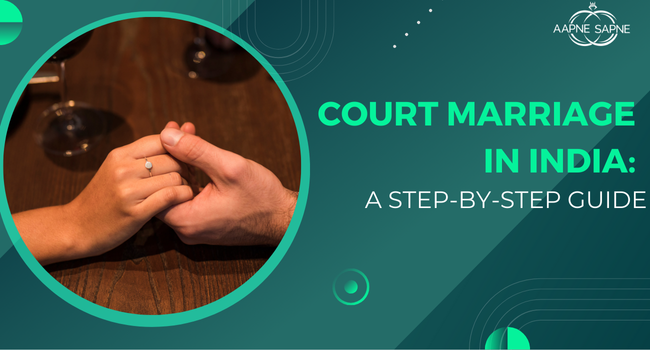Introduction
Court marriage is also referred to civil marriage or registered marriage, it is a legal union recognized by the Indian government. Court marriage process is a simple and straightforward way of marriage unlike the typical extravaganza Indian weddings. In this guide we will take you through the process of getting married in court in India.
What is the eligibility criteria?
To get legally married in court in India one must possess these criteria:
- Age: The minimum age of marriage for males is 21 and for females it is 18.
- Nationality: Both bride and groom sides should be Indian Citizens.
- Marital Status: Both must be unmarried, divorced or widowed.
- Mental Capacity: Both the parties must be mentally fit and should be declared sound mind by a competent court.
- No Relation: As prohibited by India Marriage Act, the couple must not be related by blood or marriage.
Documents Required
Below listed documents are required during the court marriage registration:
- Birth Certificates: Couples birth certificate is required.
- Identity Proof: Any identity proof, like Aadhaar card, driving licences, or passports of both.
- Address Proof: Aadhaar cards, utility bills, or rent agreements of both parties.
- Divorce Decree or Death Certificate: required if one in the couple is divorced or widowed.
- Parent's Consent: If the age of either couple is below 21 then written consent from parents is required.
- Affidavit: Required to state that neither party is already married.
- Photographs: Passport size photograph is required by both the parties.
Process
- Select a Marriage Registrar: Find the marriage registrar locally. You can find one available locally or through official government websites and search for a court marriage lawyer near me.
- Send your Application: Complete the form provided by the marriage registrar and then send it with the required documents.
- Verification: A preliminary investigation is conducted by court to make sure there are no legal impediments to the marriage, and the documents are verified by the registrar.
- Notice Publication: In a local newspaper a notice of marriage is posted to make sure there are no objections to the marriage and also to inform the public.
- Marriage Ceremony: A small and simple marriage is held in the marriage registrar's office and the couple need to sign the marriage register or documents under the presence of witnesses.
- Registration: After the marriage the registrar will do the marriage registry and issue a court marriage certificate and from then onwards that certificate will be the legal proof of your marriage.
Considerations:
- Timeframe: The entire process as being a legal process can take several weeks so it's advisable to start the procedure in advance.
- Fees: Depending on the state and district there will be a difference in charges for court marriage process and registration.
- Witnesses: You will require two witnesses during the marriage ceremony and age must be above 18.
- Customary Practices: Apart from court marriage if you are willing to incorporate customary practices and rituals and have a ceremony it completely depends on you.
Conclusion:
Court marriages are always considered to be simple, legal and hassle free ceremonies in India. By considering the steps outlined above, you can successfully complete the procedure and get married. For any doubts or questions it is always recommended to consult a legal professional.
To know more about wedding tips and event plannings visit apnesapne.in
